Search
Did you mean: Fenrir?
Remove Ads
Advertisement
Summary 
Loading AI-generated summary based on World History Encyclopedia articles ...
Search Results
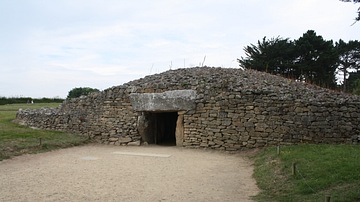
Definition
Locmariaquer
Locmariaquer is a Stone Age site in north-west France distinguished by its two large stone tombs and massive granite standing stone or menhir. The monumental structures, all built within metres of each other, were built in the 5th millennium...
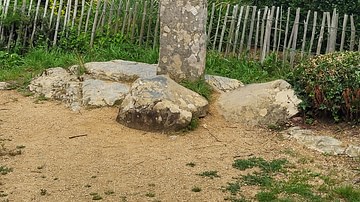
Image
Menhir of Fort La Latte
This granite menhir, located near the Castle of the Rock Goyon (Fort la Latte) in northern Brittany, France, and measuring 2.64 meters, has a very fine obelisk shape. It was broken in two by the film crew of The Vikings in 1957, and the trace...
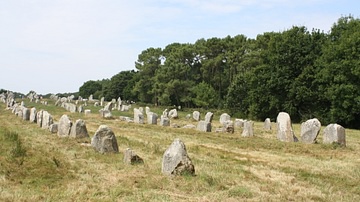
Image
Menhir Alignments, Carnac
A section of the Carnac Alignments in north-west France. These granite stone menhirs were placed in long parallel lines sometime between 5,000 and 3,000 BCE. Their purpose was most likely as markers of processional ways and sacred places...
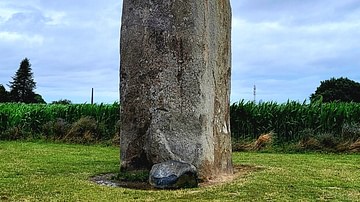
Image
Champ Dolent Menhir
The Champ Dolent menhir in northern Brittany, France has been standing in its place since the beginning of the Neolithic period. Weighing about 120 tons, it was dug from a granite quarry 4 km away. It is 9.30 m high (just over 30 feet) and...
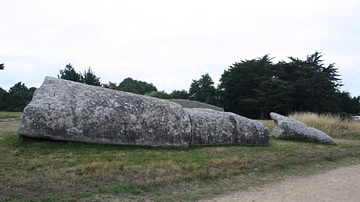
Image
Grand-Menhir, Locmariaquer
Three of the remaining pieces of the Grand-Menhir at the Neolithic site of Locmariaquer in north-west France. The menhir once stood 20 metres high and weighed 280 tons. It toppled and broke into four pieces c. 4,000 BCE, a few hundred years...
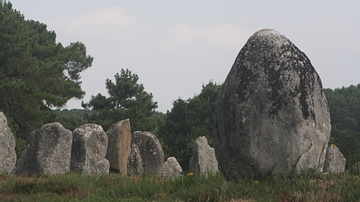
Image
Large Menhir, Carnac Alignments
A section of the Carnac Alignments in north-west France. These granite stone menhirs were placed in long parallel lines sometime between 5,000 and 3,000 BCE. Their purpose was most likely as markers of processional ways and sacred places...
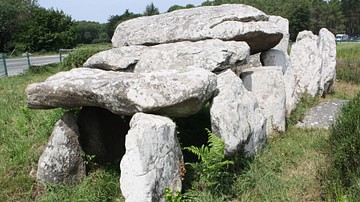
Definition
Carnac
Carnac, located on the north-west coast of France, is the site of the largest concentration of megalithic monuments in the world. Over 100 monuments, which include burial mounds, stone tombs, enclosures, and linear arrangements of menhirs...
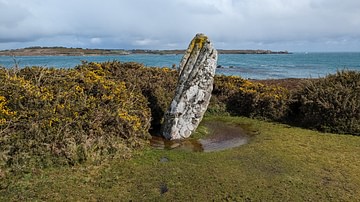
Image
The Old Man of Gugh
The leaning menhir known as the "Old Man of Gugh" is 2.4 metres / 8 feet tall and stands on a ridge on the small island of Gugh in the Isles of Scilly, UK. The archaeologist George Bonsor dug around the base of the menhir in 1900 but did...
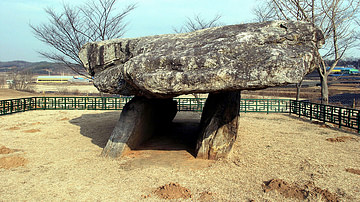
Article
Dolmens of Ancient Korea
Dolmens (in Korean: koindol or chisongmyo) are simple structures made of monolithic stones erected during the late Neolithic period or Korean Bronze Age (1st millennium BCE). In ancient Korea they appear most often near villages and the archaeological...
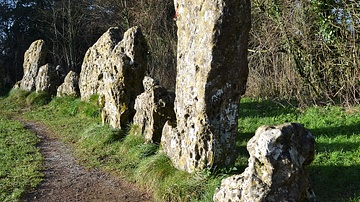
Article
Legends of the Rollright Stones, Oxfordshire
The Rollright Stones is the collective name for a group of enigmatic prehistoric monuments located next to an ancient ridgeway known as the Jurassic Way, on the border between the English counties of Oxfordshire and Warwickshire. The name...